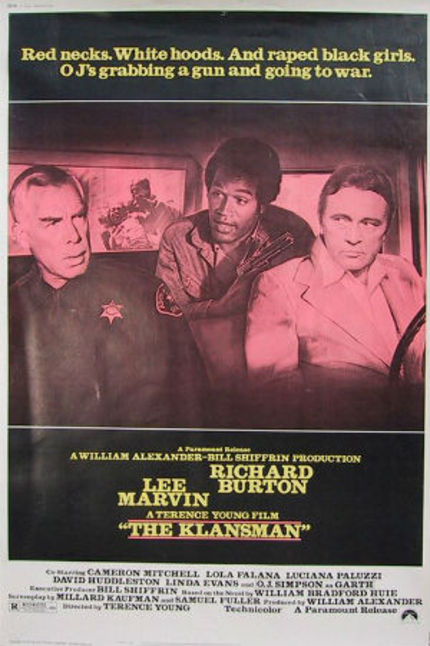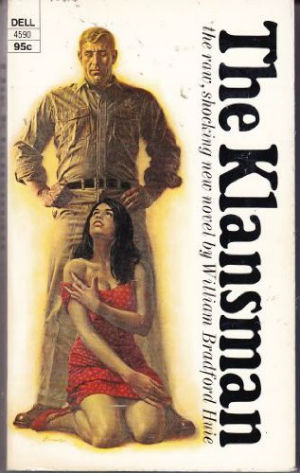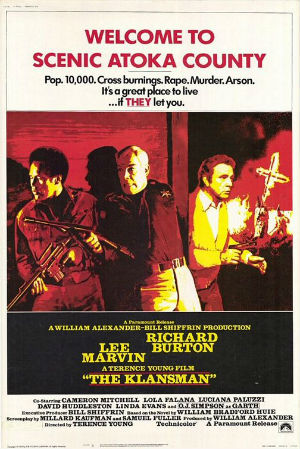70s Rewind: THE KLANSMAN Seeks Revenge On KKK, But Fails Miserably

Revenge is the thematic tissue that connects Dead Man Down, the English-language debut of director Niels Arden Oplev (opening this week), and The Klansman, Terence Young's disastrously bad picture that escaped into the world in late 1974.
As a young man growing up in Los Angeles, I remember that rumors about the off-screen, wild behavior of stars Lee Marvin and Richard Burton were rampant in the media. Those reports have some factual basis; Burton was hospitalized for more than a month after production concluded so he could "dry out," according to The Richard Burton Diaries, published in 2012. In any event, the evidence on screen reveals a very muted performance by Marvin and a very sad one by Burton, who appears to be barely capable of reading his lines.
Neither of their characters -- a small-town sheriff and a landowner, respectively -- appeared in the original script prepared by Samuel Fuller. And neither did Garth, the vengeance-seeking African-American played by none other than O.J. Simpson.
This ain't Django Unchained.
Not to be confused with The Clansman, Thomas Dixon, Jr.'s book and play that served as source materials for D.W. Griffith's The Birth of a Nation (also originally titled The Clansman), this particular film was adapted from a 1967 novel by William Bradford Huie. Huie, born and raised in Alabama, saw four of his other books turned into movies, including The Americanization of Emily and The Execution of Private Slovik. He wrote extensively about the Ku Klux Klan and civil rights issues in the late 1950s and 60s.
 The book was optioned by Wiliam Alexander, with the backing of Paramount Pictures, and in 1973 Samuel Fuller signed a deal to write and direct. According to his autobiography The Third Face, Fuller "knocked out a fierce script. Holy smoke, I put everything I had in that one!" He changed the book radically, inventing an Angela Davis-type character from the North who came South to get out the vote among black voters, only to fall in love with the local KKK leader's son, whose actions cause the KKK leader's lieutenant to begin to doubt the KKK. In the finale, the KKK leader gives a rousing speech and then sets fire to crosses on which his son, his son's lover, and his own disloyal lieutenant have been crucified. "They're better of this way," he says.
The book was optioned by Wiliam Alexander, with the backing of Paramount Pictures, and in 1973 Samuel Fuller signed a deal to write and direct. According to his autobiography The Third Face, Fuller "knocked out a fierce script. Holy smoke, I put everything I had in that one!" He changed the book radically, inventing an Angela Davis-type character from the North who came South to get out the vote among black voters, only to fall in love with the local KKK leader's son, whose actions cause the KKK leader's lieutenant to begin to doubt the KKK. In the finale, the KKK leader gives a rousing speech and then sets fire to crosses on which his son, his son's lover, and his own disloyal lieutenant have been crucified. "They're better of this way," he says.
Sensational! Lee Marvin signed up to play the KKK leader, John Cassavetes was in line to play the doubting KKK lieutenant -- and then Fuller was dropped. By his account, he was replaced by Terence Young because Paramount had a prior commitment with their Italian partners, who in turn had a deal with Young. Adding insult to injury Paramount claimed the violence in Fuller's script needed to be toned down, so they hired "an old studio hand" (Millard Kaufman, who reportedly fronted for Dalton Trumbo on 1950's Gun Crazy) to rewrite the screenplay.
Fuller's autobiography says that the script "had an FBI agent infiltrating the KKK," but he admits that he's never sat through the picture. That description, though, has somehow found its way into numerous online references, including IMDb.com and Amazon.com, even though the movie has no such character.
What Fuller does get right is that the character Marvin agreed to play was "changed into a Southern sheriff." It seems that Kaufman went back to the source material, at least for certain elements. Huie's book features a Southern sheriff and his friendship with a local landowner, which is restored in the movie, though the movie diverges from the book in other ways.
To be absolutely fair, the version of The Klansman that I watched recently via Amazon.com's streaming service is not the original theatrical version, but an edited edition, removing profanities, nudity, and violence; it looks like something that could have played on broadcast television in the U.S. back in the 70s.
At its core, however, The Klansman is a lousy picture. Even if Marvin and Burton had been at full strength, nothing good could have been made from the script. (Fuller again: "The reworked story made no sense as social commentary and was repugnant as entertainment. They'd turned my original work into a disastrous piece of bullshit and launched the production. Against my objections, they left my name on it.")
 Sheriff Track Bascomb (Marvin) is the type of law enforcement officer who, when he comes upon a group of white men bouncing around a black man within a circle of violence, breaks it up gently and tells everyone to go home. (He's a member of the KKK, too.) His friend Breck Stancill (Burton) lives on a big house on a big piece of property in the hills above the small town, but delights in posting posters intended to rattle the cages of the local KKK members, which include the town's mayor (David Huddleston, playing seriously the same kind of racist he lampooned the same year in Mel Brooks' Blazing Saddles) and deputy sheriff Butt Cutt Cates (Cameron Mitchell).
Sheriff Track Bascomb (Marvin) is the type of law enforcement officer who, when he comes upon a group of white men bouncing around a black man within a circle of violence, breaks it up gently and tells everyone to go home. (He's a member of the KKK, too.) His friend Breck Stancill (Burton) lives on a big house on a big piece of property in the hills above the small town, but delights in posting posters intended to rattle the cages of the local KKK members, which include the town's mayor (David Huddleston, playing seriously the same kind of racist he lampooned the same year in Mel Brooks' Blazing Saddles) and deputy sheriff Butt Cutt Cates (Cameron Mitchell).
The plot is set in motion when a white woman (Linda Evans) is raped and her unseen assailant is quickly rumored to be a black man. The KKK hunts down a pair of black men they happen to see; one is castrated and killed, and the other escapes to rain down vengeance on "whitey." The survivor is played by O.J. Simpson, adding an unpleasant aftertaste for modern viewers, but even in 1974, his inadequate performance and stilted delivery of dialogue indicates he was best suited for other types of work.
He becomes a sniper and starts killing the men responsible for his friend's death. Meanwhile, Bascomb welcomes back native daughter Loretta Sykes (Lola Falana), who has returned home to spend time with her dying grandmother, but her reputation as a civil rights activist convinces the KKK that she's come to stir up trouble "among the blacks" at a rapidly approaching election. Then, at Bascomb's urging, Stancill takes in the rape victim, who has been ostracized by the town -- not because she was raped, but because she had sex with a black man -- and they begin a romance. As for Bascomb, his loyalties become increasingly divided.
It all leads up to a fiery confrontation, with all the major characters converging on Stancill's mountain property in a hail of gunfire and explosions.
Though its notoriety will always inspire film fanatics like me to seek it out, The Klansman is a painful exercise to sit through. Mostly, it's a showcase for lost dreams and failed ambitions, a reminder of what can happen when studios and filmmakers misguidedly attempt to cash in on social issues.
70s Rewind is an occasional column on my favorite movie decade.







